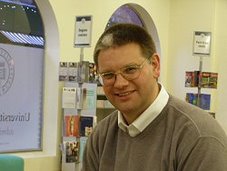I returned back to Oxford last night at about ten o'clock, and instead of the usual Sunday night bustle in the College where I have my accommodation, the place was wreathed in silence. Whilst it is now out of term-time, there should still have been some students around, including eighty or so interview candidates. Had everyone pulled out of their interviews? Had I got the date wrong?
I shouldn't have worried - this morning, as I was eating my breakfast, the relative peace was disturbed by a very animated group of at least forty interview candidates going mob-handed to the dining hall. It was encouraging to see that they were so enthusiastic, and had obviously started to bond with each other. They were being led by a guide, dressed in an eye-catching red t-shirt, with a couple of minders bringing up the rear.
Given how nerve-wracking it must be to come for an interview, I was interested in talking to the student helpers (some of whom must have been going through the process only a year ago) to find out what support (if any) they provide to the applicants. I wandered over to "mission control" (a couple of large seminar rooms) and after introducing myself to the Junior Common Room President (who seemed to be masterminding the process whilst also writing an essay on theoretical physics, an impressive example of multi-tasking) I received a tour of the facilities. The dominant feature is a set of notice boards, which display the times of the interviews, along with print outs of e-mails providing amendments of alterations to the programme. There were also lots of maps, and some discretely placed notices for Nightline (the student version of Samaritans) for any candidates who were suffering the strains and wanted a sympathetic voice to talk to. There were also a couple of computers, stacks of newspapers, and an abundance of refreshments.
I was approached by one of the red shirted helpers, who was checking I was ok - when I explained my purpose she invited me over to talk to a group of five students. They represented a mix of subjects (Engineering, English, Psychology and Physiology) and experience (first to final years) but they were all very enthusiastic and keen to answer my questions.
I started by asking them what roles they had to perform - it was clear that they saw their main responsibility as being to support the applicants, making sure that they were able to direct them to their interviews, answer questions about the programme, and serve as friendly faces at such a time of uncertainty. They had organised a quiz for the interviewees on the first night (though at least one of the group thought that the general knowledge questions were really tough, and stressed that the actual Oxford interviews were more about subject-specific material), and were organising trips to the cinema, and also roller-skating (the visions of candidates the following day with their legs in plaster I kept to myself).
They were also very clear that whilst the requirement in most Oxford subjects to attend multiple interviews (generally at least two, but in the case of Psychology and Physiology there were three) prolonged the experience, with some candidates required to remain at the College for four days, it did provide them with a "second chance" - in most cases they had felt that this was more of a psychological comfort, and at least one of the group found the second interview harder than the first, even with the benefit of the initial run-through. A couple of students had come from schools that provided some form of interview training or preparation - one girl (an Engineer) felt that the training (provided by a private company) had been of little value; whilst it left her with a lot of hand-outs and reading lists, the experience proved to be nothing like the real thing. Another student, reading English, had been at a school that had been visited by the Oxford Access Scheme - she was interviewed by a Oxford student as part of the programme and indicated that it was a very useful and relevant experience that gave her the confidence to feel that Oxford was an achievable aim. I also asked if they felt they had been in competition with the other candidates at their interview - all of the student helpers indicated that this was not the case, and felt very supported by the group.
Finally, I asked if they had one piece of advice about the interviews - they were unanimous - "Be yourself!"
Throughout the period talking to the helpers, which must have lasted thirty minutes, they kept disappearing off to deal with queries or resolve concerns. They were calm, professional and obviously had a great deal of empathy for the candidates. In what may be a very trying period for an interviewee, it is good to know that there are some supportive souls around who know exactly how they are feeling.
As I left the JCR President was trying to assist an applicant who had left their keys in their room. From theoretical physicist to amateur locksmith in the blink of an eye.
